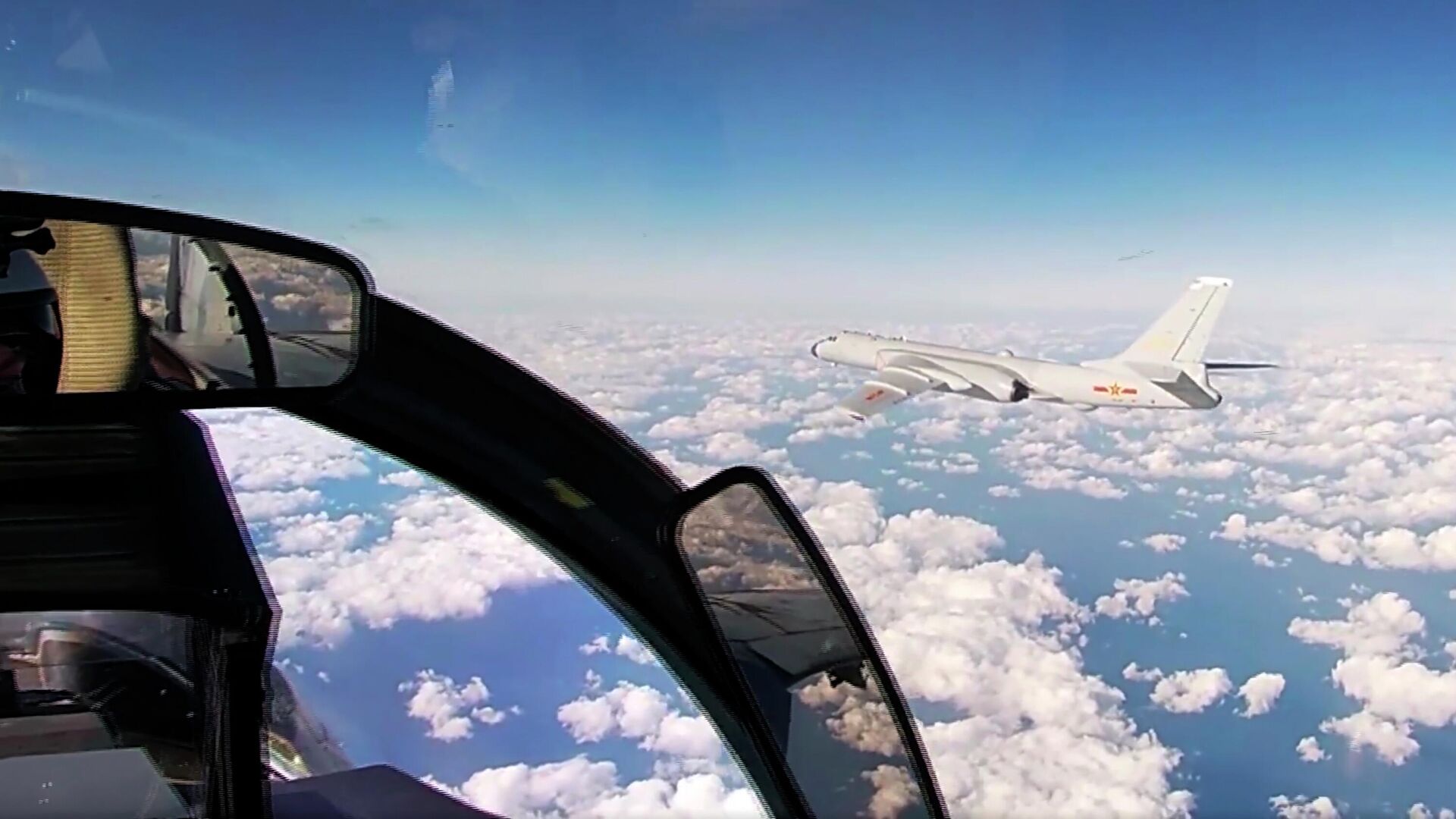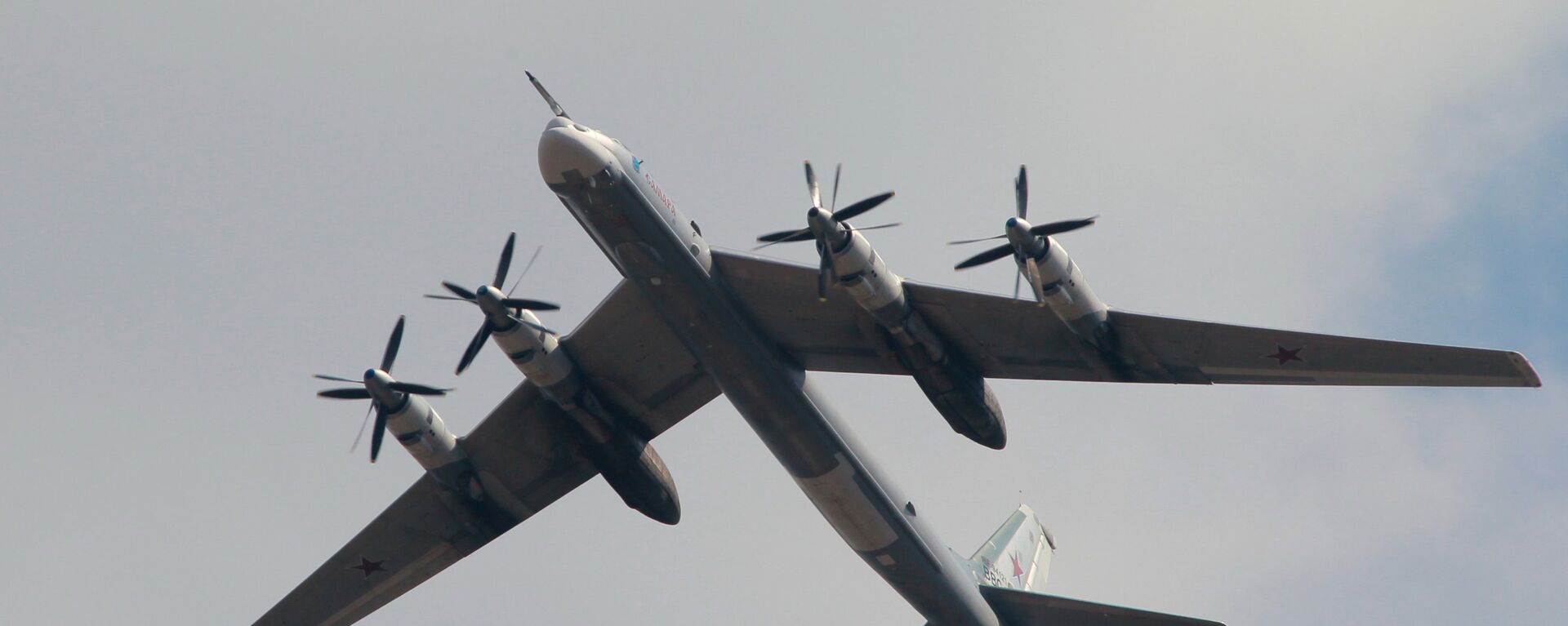https://sputnikglobe.com/20220524/russian-chinese-strategic-bombers-complete-13-hour-long-patrol-over-sea-of-japan-east-china-sea-1095739898.html
Russian, Chinese Strategic Bombers Complete 13-Hour-Long Patrol Over Sea of Japan, East China Sea
Russian, Chinese Strategic Bombers Complete 13-Hour-Long Patrol Over Sea of Japan, East China Sea
Sputnik International
The bombers were escorted by the Japanese and South Korean jets during certain parts of their patrolling route. No incidents in the air have been reported. 24.05.2022, Sputnik International
2022-05-24T11:24+0000
2022-05-24T11:24+0000
2022-05-24T13:10+0000
world
russia
china
south korea
sea of japan
east china sea
japan
https://cdn1.img.sputnikglobe.com/img/07e6/05/0c/1095458232_0:27:3000:1715_1920x0_80_0_0_2efe9a38a96a49e01fa50bc9280dcc22.jpg
Russian Tupolev Tu-95MS (NATO reporting name: Bear) and Chinese Xian H-6 strategic bombers have successfully completed the 13-hour-long patrol during which the aircraft crossed over parts of the Sea of Japan (also known as East Sea) and the East China Sea. The Russian and Chinese bombers were covered along their path by Russia Air Force 4+ generation fighter jets Sukhoi Su-30SM (NATO reporting name: Flanker-H).The ministry stressed that the patrolling was not conducted against any specific state and was carried out in full accordance with international laws.At the same time, South Korean and Japanese Air Forces accompanied the Tu-95SM and Xian H-6 bombers on certain stretches of their route. Seoul sent F-2 jets, while Japan deployed its F-15 fighters to escort the Chinese and Russian aircraft, which stayed away from the two nations' airspace.South Korean media reported that the bombers entered the country's air defence identification zone (KADIZ), which extends beyond the borders. Russia does not recognise KADIZ since its establishment is not regulated by international laws.Tupolev Tu-95 bombers are fit to travel up to 15,000 kilometres without refuelling, and can stay in the air even longer if they undergo air refuelling mid-flight. Chinese Xian H-6, designed after Soviet Tupolev Tu-16, has more modest flight range of 6,000 kilometres, but can also refuel in the air extending its flight time.
https://sputnikglobe.com/20200325/watch-russian-tu-95-warplanes-escorted-by-japanese-f-2-fighters-1078700706.html
china
south korea
sea of japan
east china sea
japan
Sputnik International
feedback@sputniknews.com
+74956456601
MIA „Rossiya Segodnya“
2022
Tim Korso
https://cdn1.img.sputnikglobe.com/img/07e6/03/0d/1093831826_0:0:216:216_100x100_80_0_0_e3f43a960af0c6c99f7eb8ccbf5f812c.jpg
Tim Korso
https://cdn1.img.sputnikglobe.com/img/07e6/03/0d/1093831826_0:0:216:216_100x100_80_0_0_e3f43a960af0c6c99f7eb8ccbf5f812c.jpg
News
en_EN
Sputnik International
feedback@sputniknews.com
+74956456601
MIA „Rossiya Segodnya“
Sputnik International
feedback@sputniknews.com
+74956456601
MIA „Rossiya Segodnya“
Tim Korso
https://cdn1.img.sputnikglobe.com/img/07e6/03/0d/1093831826_0:0:216:216_100x100_80_0_0_e3f43a960af0c6c99f7eb8ccbf5f812c.jpg
china, south korea, sea of japan, east china sea, japan
china, south korea, sea of japan, east china sea, japan
Russian, Chinese Strategic Bombers Complete 13-Hour-Long Patrol Over Sea of Japan, East China Sea
11:24 GMT 24.05.2022 (Updated: 13:10 GMT 24.05.2022) The bombers were escorted by the Japanese and South Korean jets during certain parts of their patrolling route. No incidents in the air have been reported.
Russian Tupolev Tu-95MS (NATO reporting name: Bear) and
Chinese Xian H-6 strategic bombers have successfully completed the 13-hour-long patrol during which the aircraft crossed over parts of the Sea of Japan (also known as East Sea) and the East China Sea. The Russian and Chinese bombers were covered along their path by Russia Air Force 4+ generation fighter jets Sukhoi Su-30SM (NATO reporting name: Flanker-H).
The ministry stressed that the patrolling was not conducted against any specific state and was carried out in full accordance with international laws.
At the same time, South Korean and Japanese Air Forces accompanied the Tu-95SM and Xian H-6 bombers on certain stretches of their route. Seoul sent F-2 jets, while Japan deployed its F-15 fighters to escort the Chinese and Russian aircraft, which stayed away from the two nations' airspace.
South Korean media reported that the bombers entered the country's air defence identification zone (KADIZ), which extends beyond the borders. Russia does not recognise KADIZ since its establishment is not regulated by international laws.
Tupolev Tu-95 bombers are fit to travel up to 15,000 kilometres without refuelling, and can stay in the air even longer if they undergo air refuelling mid-flight. Chinese Xian H-6, designed after Soviet Tupolev Tu-16, has more modest flight range of 6,000 kilometres, but can also refuel in the air extending its flight time.




